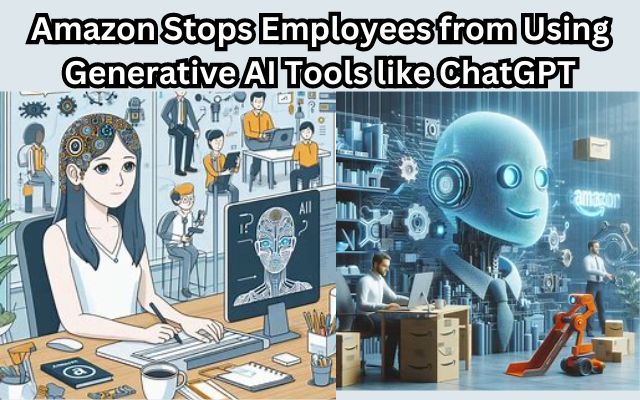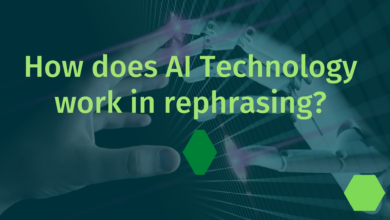Amazon Stops Employees from Using Generative AI Tools like ChatGPT

Amazon Stops Employees from Using Generative AI Tools like ChatGPT – a headline that has recently taken the tech world by storm. In an era where artificial intelligence (AI) is revolutionizing various aspects of our lives, Amazon’s decision to halt the use of generative AI tools by its employees has raised many eyebrows.
Generative AI tools, such as ChatGPT, have been instrumental in automating and enhancing numerous processes within the tech giant’s operations. These tools, powered by advanced machine learning algorithms, have the ability to generate human-like text, making them invaluable for tasks ranging from customer service to data analysis.
However, Amazon’s recent move indicates a significant shift in its AI strategy. This article aims to delve into the reasons behind this decision, its implications, and the reactions it has elicited from the tech industry. Stay tuned as we unpack this complex issue.
Background
Artificial Intelligence (AI) tools, particularly generative ones like ChatGPT, have been transforming the tech industry. These tools, powered by advanced machine learning algorithms, can generate human-like text, making them invaluable for a variety of tasks. From automating customer service responses to aiding in data analysis, these AI tools have found a place in many aspects of Amazon’s operations.
However, Amazon recently issued an advisory to its employees against using third-party generative AI tools like ChatGPT for work-related purposes. This decision was reportedly driven by concerns over confidentiality and ownership rights. The company warned against sharing any confidential Amazon, customer, or employee data while using these third-party generative AI tools.
This move by Amazon aligns with similar measures taken by other tech giants like Samsung and Apple, who have also restricted the use of generative AI tools internally. Notably, these restrictions are partly influenced by concerns regarding ownership rights, particularly in light of Microsoft’s significant investment in OpenAI, the company behind tools like ChatGPT.
Amazon’s Decision
In a surprising move, Amazon recently issued an advisory to its employees against using third-party generative AI tools like ChatGPT for work-related purposes. This decision was reportedly driven by concerns over confidentiality and ownership rights. The company warned against sharing any confidential Amazon, customer, or employee data while using these third-party generative AI tools.
Amazon’s policy suggests potential risks of using such tools include ownership or licensing rights over content inputted by employees. This includes a wide range of outputs such as emails, internal documentation, and pre-launch materials, which could be accessed, reviewed, and distributed by the owners of the generative AI.
This decision aligns with similar measures taken by other tech giants like Samsung and Apple, who have also restricted the use of generative AI tools internally. Notably, these restrictions are partly influenced by concerns regarding ownership rights, particularly in light of Microsoft’s significant investment in OpenAI, the company behind tools like ChatGPT.
Even Microsoft, despite its investment in OpenAI, temporarily revoked access to in-house generative AI tools for its employees. This underscores the complex dynamics and concerns surrounding the use of third-party AI tools within corporate settings.
Implications of the Decision
Amazon’s decision to restrict the use of generative AI tools like ChatGPT has far-reaching implications. On one hand, it underscores the company’s commitment to data privacy and security. By limiting the use of third-party AI tools, Amazon aims to prevent potential leaks of confidential information. This move could also help Amazon avoid complex legal issues related to ownership or licensing rights over content generated by these tools.
On the other hand, this decision could impact the efficiency and productivity of Amazon’s operations. Generative AI tools like ChatGPT have been instrumental in automating various tasks, thereby saving time and resources. Restricting their use could mean reverting to more traditional, time-consuming methods.
Moreover, this decision could potentially stifle innovation within the company. Generative AI tools are at the forefront of technological advancement, and restricting their use could limit opportunities for innovation.
Industry Reaction
The tech industry has shown mixed reactions to Amazon’s decision to restrict the use of generative AI tools like ChatGPT. While some view it as a necessary step to safeguard confidential information and maintain ownership rights, others believe it could hinder innovation and efficiency.
Several industry experts have noted that Amazon’s move aligns with similar measures taken by other tech giants. For instance, Samsung and Apple have also restricted the use of generative AI tools internally. These restrictions are partly influenced by concerns regarding ownership rights, particularly in light of Microsoft’s significant investment in OpenAI, the company behind tools like ChatGPT.
However, some critics argue that these restrictions could stifle creativity and limit the potential benefits of AI. Despite these concerns, it appears that the trend among tech giants is moving towards more cautious use of AI tools.
Comparison with Other Tech Giants
Amazon’s decision to restrict the use of generative AI tools like ChatGPT is not an isolated incident. Other tech giants, such as Samsung and Apple, have also implemented similar restrictions. These companies share Amazon’s concerns about confidentiality, ownership rights, and the potential misuse of AI-generated content.
Interestingly, even Microsoft, despite its significant investment in OpenAI (the company behind ChatGPT), temporarily revoked access to in-house generative AI tools for its employees. This move underscores the complex dynamics and concerns surrounding the use of third-party AI tools within corporate settings.
These collective actions by tech giants reflect a growing trend in the industry. While AI tools offer numerous benefits, their use also raises important questions about data privacy, ownership rights, and the potential for misuse. As a result, tech companies are becoming increasingly cautious about how these tools are used within their organizations.
- Bing AI’s 3D Image Generator: The Future of Instagram or Just a Passing Trend?
- Transform Your Audio Quality with These Top 3 AI Tools
- Understanding AGI: A Journey into Artificial General Intelligence
- 10 Steps to Adopting Artificial Intelligence in Your Business
- How artificial intelligence can improve protein detection
Conclusion: Amazon Stops Employees from Using Generative AI Tools like ChatGPT
Amazon’s decision to restrict the use of generative AI tools like ChatGPT has sparked a significant debate in the tech industry. While the move aligns with similar measures taken by other tech giants, it also raises important questions about the future of AI in the workplace.
The implications of this decision are far-reaching, affecting everything from data privacy and ownership rights to innovation and efficiency. As tech companies continue to navigate these complex issues, the industry will likely see more changes in how AI tools are used.
Amazon’s decision underscores the need for a balanced approach to AI usage. While AI tools offer numerous benefits, their use also presents significant challenges. As we move forward, it will be crucial for tech companies to find a balance that maximizes the benefits of AI while minimizing its potential risks.







